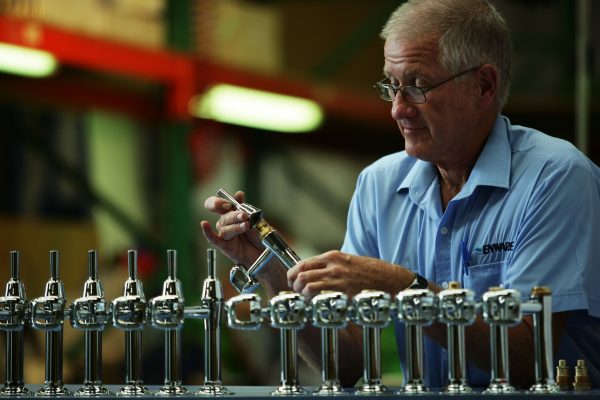Plumbers warn of health risks in rush to lead-free products
One of the nation’s oldest tapware manufacturers says moves by state and federal building authorities to mandate lead-free plumbing products could have serious health risks by leading to increased bacterial contamination in water supplies.
The Victorian School Building Authority has announced that all new schools and school upgrade works must exclude any plumbing product containing lead, which is expected to lead to manufacturers ditching brass and copper alloy products.
It followed growing public concern about the risks of lead dissolving into drinking water from brass plumbing products after traces were found in drinking water supplies at the Perth Children’s Hospital and in public drinking fountains in Geelong and Warrnambool in Victoria.
But the Sydney-based Enware Australia, an 80-year-old specialist plumbing and personal safety equipment manufacturer and supplier, said a move to stainless steel plumbing products could have unintended health risks given how easily bacteria could adhere to such systems.
“There is no denying if we can take lead out of the system that is going to have health benefits, but it must be done with a thoughtful, measured approach,” Enware chief executive Vicki Edler says.
“We want to see a less emotive and more scientific approach to this.”
She says existing brass and copper alloy products also showed inherent antibacterial qualities that were not necessarily present in alternatives and claimed products should not be considered fit for purpose simply because they were low in lead.
She said resellers and manufacturers were already moving to manufacturing or importing stainless steel tapware products that may not even meet Australian standards.
“We have avoided going down that path. It doesn’t feel right to be moving down that path if we are concerned about the unintended consequences,’’ Vicki says.
The Australian Building Codes Board, which oversees the compliance framework for both the building and plumbing industries, is working on a regulatory impact statement that will examine options to tackle the issue of lead in drinking water.
The statement will be available for public comment at the end of the year and is expected to be legislated some time in 2021 in the new national construction code.
The ABCB has reviewed both the US and European Union approaches, as well as the findings of Professor Mark Taylor from the Macquarie University who was commissioned two years ago to explore the impacts of lead in plumbing products and materials.
Professor Taylor recommended using low lead or lead-free plumbing components during the installation of drinking water systems in order to limit the release of lead into drinking water.
But research by academics at the University of Wollongong, commissioned by Enware, found bacteria could easily adhere to stainless steel surfaces.
“It is important to consider its use in systems, products in the plumbing industry that act as conduits for bacterial contamination, leading to serious health risks,’’ one study said.
“The identification of other materials such as brass or polymers … show bacterial resistant properties could provide alternative solutions.”
Other academic studies have warned that rapid action to legislate for the replacement of lead containing brass fittings could be hasty and not based on a comprehensive investigation and analysis of the underlying issues relating to lead levels in Australia.
“As a company, we are not wedded to brass. If there is a product that is safe and compliant, we are happy to move to that material,’’ Vicki says.
Enware regulatory affairs manager Nathan Spinner said the company wanted the opportunity to properly review its supply chains ahead of any changes.
“We want to work towards a national framework which will move from the materials specification we have now to a new framework,’’ Nathan says.
The nation’s biggest bathroom products manufacturer, Reece, said a strict compliance framework should accompany any direction around industry changes.
“We fully support industry changes that address the public’s concerns of lead in drinking water. This is a complex but critical issue, and we are confident in the approach that the Australian Building Codes Board has adopted to navigate the many challenges,’’ says Reece chief executive Peter Wilson.
“This national approach will ensure that we get the right outcome from a health perspective that is safeguarded by a functional Australian Standards compliance program.”
Source:
Damon Kitney (2020), Plumbers warn of health risks In rush to lead-free products, The Australian, Retrieved August 31 2020, https://www.theaustralian.com.au/business/companies/plumbers-warn-of-health-risks-in-rush-to-leadfree-products/news-story/75005ac248697972124b216c9141d568


